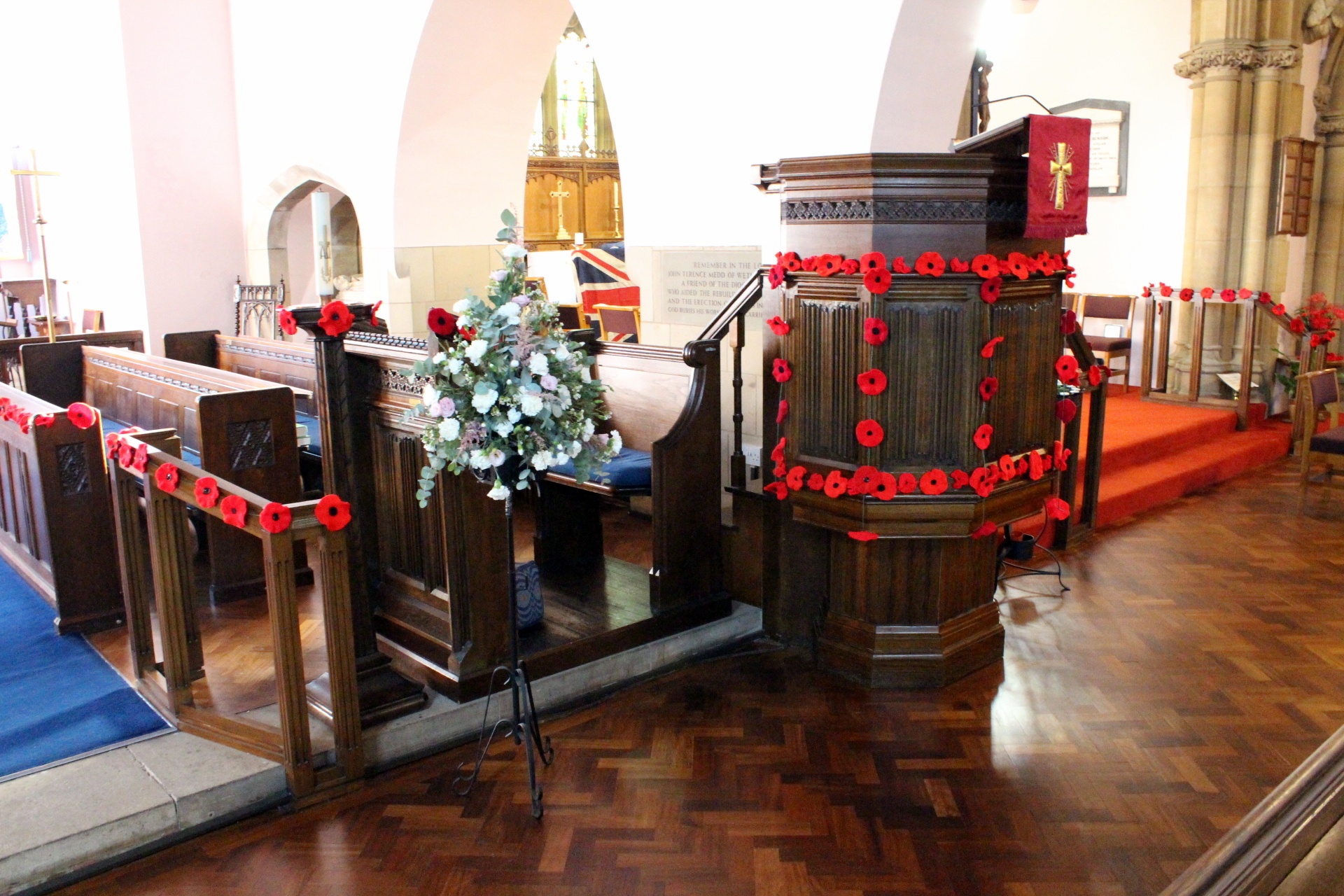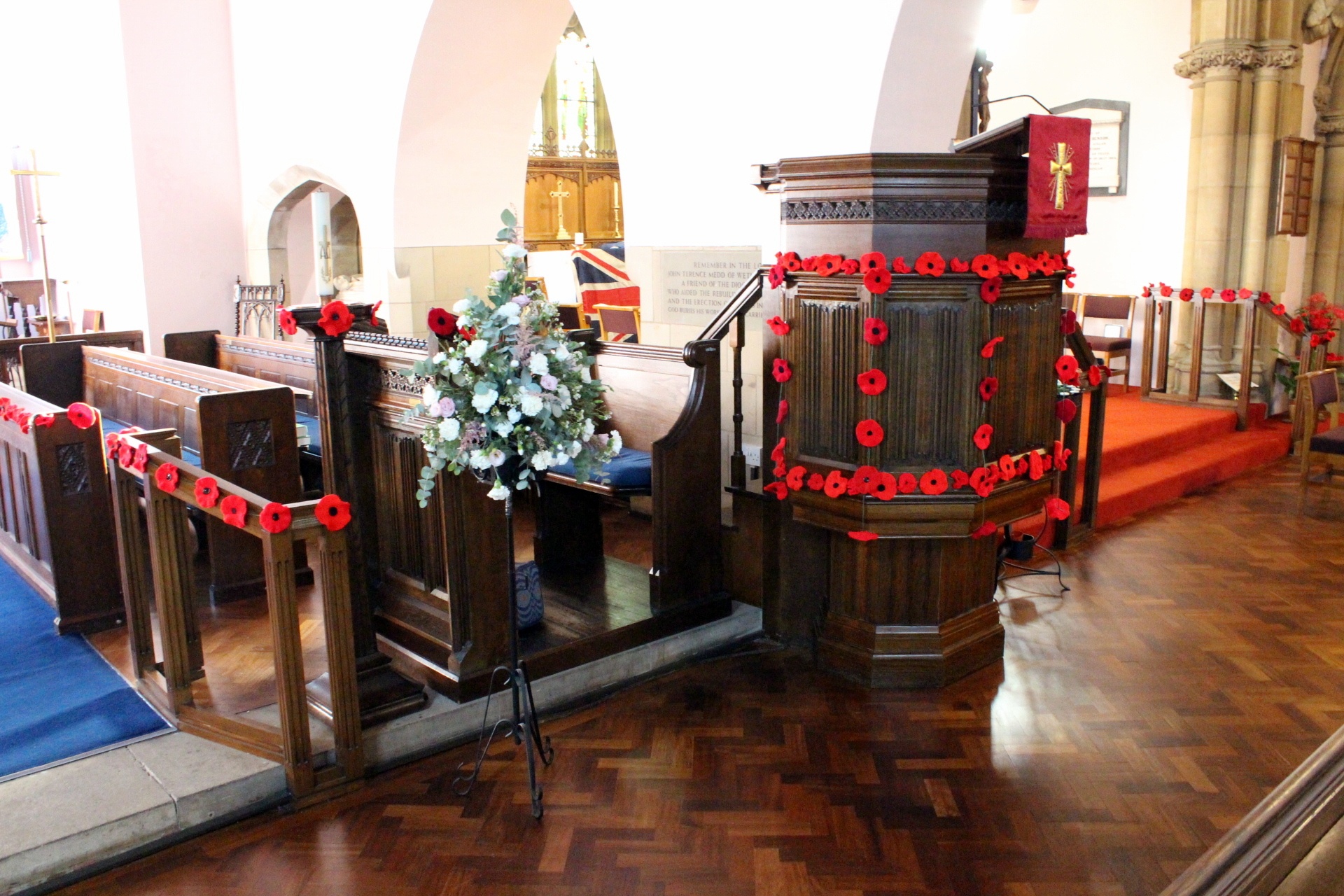
November 2025 Magazine
Wow, no lateness in getting the magazine out this month !!
Pauline & Bob - co-editors..
Updated 30th October 2025
_______________________________________________________
Dear Friends,
He has just emerged from the dust, primitive and powerful, his muscles tensed, ready to burst into action; his head is tilted back to draw his first breath and his lungs are opened to draw in the air.
This is Adam – an alabaster sculpture made by Sir Jacob Epstein in 1939. The seven-foot, three ton sculpture now stands in the entrance hall of Harewood House.
Epstein’s Adam does not display the beauty of human body like Michelangelo’s David. This marble figure simply stretches upward to meet his creator, and so demonstrates the energy and power that the Creator instals in the man who is to bear the divine image on earth. Adam is fearless, innocent, unconscious of his nakedness. His eyes seek the light and with it the life-giver.
Adam, the first created human being, is perfectly made, and God intends him to be the keeper of the world by means of the power, energy and goodness he has received. Adam, as we know, took a different path, and would use all he was given to work upon the earth instead of enjoying life in the Paradise. The Psalmist tells us that humans are made little lower than the angels, yet it is a mistake to think that we are our own masters, and that we are sufficiently strong and powerful to rule the world and to control our own destiny. Epstein’s Adam tells us that all power we possess is a gift from our Creator.
Though humans strayed from the original purposes set to them by God, yet the Son of God assumes the sin-stained body of a man to become the Carpenter of Nazareth. Through Jesus’ earthly life and work we are redeemed from the bondage of sin, and so to live a life that fits the original purpose God set to us.
Norma
_________________________________________________________
Church of England partnerships of £11m will benefit nearly half of parishes
Nearly half of parishes across the Church of England will be able to benefit from £11m of investment in partner organisations dedicated to sharing the Christian faith, new figures show.
A range of traditions, activities and organisations will be supported through the funding, from expanding an Anglo-Catholic mission network to using social media content to share the gospel message.
The partnership aims to strengthen local mission by equipping the Church in five ministry areas. These include outreach and engagement with children, young people, and their families; establishing new worshipping communities; enhancing the effectiveness of digital evangelism and discipleship; addressing pressing missional challenges; and collaborating with networks to extend their reach and share learning and resources.
The investments made by the Church’s Strategic Mission and Ministry Investment Board (SMMIB) are expected to strengthen mission in around 45 per cent – 5,500 – of Church of England parishes.
___________________________________
Churches unite in prayer for peace in the Middle East
Church of England congregations across the country have come together with churches from other denominations to pray for the people of Gaza, the wider Holy Land and the Middle East.
A coalition of Christian charities and aid agencies, working in partnership with ecumenical church leaders, organised a dedicated Day of Prayer for Peace in late September. The initiative coincided with the UN International Day of Peace.
The Bishop of Southwark, Christopher Chessun, the Lead Bishop for the Holy Land said: “In the face of all that is happening in Gaza, I appeal for respect for the value and dignity of every human life. Christians cannot remain silent – we must speak out for the rights and freedoms of both Israelis and Palestinians and we must be diligent in prayer for the peoples of the Holy Land.”
Supporting this effort, the Anglican Archbishop in Jerusalem, Dr Hosam Naoum, has written a prayer for an immediate end to the war, the release of all hostages, help for those suffering hunger and starvation in Gaza and beyond, and the resumption of negotiations for a just and lasting peace.
Prayer resources at:  Churches Together in England and
Churches Together in England and  Churches Together in Britain and Ireland.
Churches Together in Britain and Ireland.
____________________________________________
November Diary Page
All services at the usual times
BIBLE STUDY (via ZOOM) EVERY WEDNESDAY AT 7PM DURING TERM TIME.
PRAYER MEETING FIRST MONDAY IN THE MONTH 7pm IN CHURCH
SUNDAYS
9am Holy Communion BCP
10am Parish Communion
6.30pm Evening Prayer
TUESDAYS
10am Holy Communion
SATURDAY 1st NOVEMBER
9.30am Churchyard tidy / Church cleaning
SUNDAY 2nd NOVEMBER
ALL SAINTS
9am Holy Communion
10am Parish Communion
3pm SERVICE OF COMMEMORATION OF THE FAITHFUL DEPARTED
6.40pm Evening Prayer
SUNDAY 9th NOVEMBER
REMEMBRANCE SUNDAY
Services at the usual times
WEDNESDAY 12th NOVEMBER
Coffee Morning 10am -11.30am
PCC Meeting 7.00pm
SUNDAY 16th NOVEMBER
SECOND SUNDAY BEFORE ADVENT
SUNDAY 23rd NOVEMBER
CHRIST THE KING
SUNDAY 30th NOVEMBER
ADVENT SUNDAY
FIFTH SUNDAY – ONE SERVICE ONLY at 10am
_______________________________________________________

CHRISTMAS CONCERT
On Sunday 7th December at 3.00pm, there will once again be a Christmas Concert in church given by Vox Choir North East.
An afternoon of Christmas music to suit all tastes followed by coffee/tea and mince pies.
This proved to be very popular last year and a lovely way to get into the Christmas spirit.
If you haven’t heard this local group of singers before, come along, you won’t be disappointed!
Tickets at the door £10 under twelves free. Cash or card accepted.
___________________________________________________
9 November – Margery Kempe
Here is a saint for any out-spoken, emotional person who also struggles with depression and human failings in the quest to live their best life.
Margery Kempe was born in 1373, the daughter of a wealthy businessman in King’s Lynn. She married John Kempe and had 14 children. She described herself as “not lettrid”, for she could not read or write.
Margery Kempe was far from the usual ‘saint’ of the Late Medieval Ages. She was not a recluse. She had not defended her virginity. She was not a submissive wife. Instead, she must have been stormy to live with, as she was known to be very emotional, and at times, very rude. In fact, her emotion engagement with the liturgy deeply unsettled the established local clergy, who distrusted her flare-ups.
Margery began her spiritual pilgrimage with depression – probably brought on by the birth of her first child. She was so ill that she had been forcibly locked away in a room by her spiritual director, when she saw a vision of Jesus. He said to her: “Daughter why have you forsaken Me? I never forsook you.” Margery was then reassured that her depressive guilt and fear were misplaced, and that Jesus was actually welcoming her into a personal relationship with Himself.
In 1436 Margery dictated her famous book, ‘The Book of Margery Kempe’. It was a sort of spiritual autobiography, and for centuries only edited bits of it were published for people to read. Then in 1934 a complete manuscript was found, and it led to a re-evaluation of Margery herself.
After years of being remembered as a devout mystic, Margery emerged as a more complete, more human woman from these pages. She loved clothes. She envied other people. She sometimes had fantasies, and sometimes few scruples. But she was also honest in her growing relationship with Christ, and finally found in Him a fulfilment she could find nowhere else. That fulfilment helped her on her journey to gradual transformation.
She has been called ‘the embodiment of an honest soul on a quest for God.’ She died in 1440, aged 67, a good age in those days.
______________________________________

COFFEE MORNING
The Coffee morning in October was once again a big success even though we were down on numbers due to illness or holidays.
As usual, it raised money for church funds through sales of home made cakes, hand made cards for all occasions, books, and of course, the raffle!!
The next one will be on Wednesday 12th November from 10am – 11.30am.
You are all welcome to come along for a chat with friends and as many cups of tea/coffee with biscuits, as you can manage!! All for just £2.00p.
See you there!!
______________________________________

“Only doing my bit”
If you have talked to people who served or worked in the many industries during the last war, you will have often heard this modest reply…”I was only doing my bit”.
I remember a few years ago visiting my Dad when he lived in a care home in Stockton. If I went on an afternoon just after lunch, a familiar pattern occurred, the residents moved from the dining room into the large lounge, and one after another started to fall asleep! To be honest, my Dad was one of the first to do so, so I usually talked to anyone awake. Many had few or no visitors, so were glad of the chat.
On one visit, I got talking to a lady in the opposite chair…. Most of the residents had a regular seat and you were told off if you sat in it, as I found to my cost a couple of times.
As we talked, she said, “I understand your father was in the air force during the war”. “Yes”, I replied, “he was ground crew servicing and repairing the aircraft”. “Did he work on the Lancaster bomber” she asked. “Yes”, I said, “he, like many others were moved around the country and abroad to wherever the need was”.
“I used to build them!” she said. After I let that statement sink in, I said “You must tell me the story behind that!”
In the early years of the war, as a young girl, she worked in the office of a shop on Stockton High Street. She came home one day to find what was, at the time, a familiar brown envelope printed across the top ’On His Majesty’s Service’. The letter inside was blunt and to the point. The following Monday she was to report to an address in Manchester to carry out war work in a factory. The letter went on to say she could take one suitcase of clothes, and of course, her gas mask! A travel permit was included with the letter, and a one-way rail ticket. The journey over to Manchester, she recalled, was very long and tiring, as passenger trains were moved into sidings to allow the more important troop and freight trains to pass. Arriving late afternoon, she was directed to a bus stop, as the factory was on the then outskirts of Manchester. Only when she got off the bus did she discover it was an aircraft factory,
At the gates she was directed to the Labour office. where the person who greeted her was quite abrupt. He took her papers, marked her off his list, gave her papers with the address of her accommodation, and told her she was to report back to the office at 7 o’clock the following morning, That was her welcome after a long tiring train journey! The factory gate keeper directed her to the address, which was within walking distance. The address turned out to be a large house requisitioned for the war. She was greeted by the house keeper who took her to her room. Little did she know this would be her home for the duration of the war. The house keeper apologised as she had missed the evening meal, but she did make her a sandwich and a cup of tea.
Despite being very tired, she slept very little, and was back at the factory well before 7am the following morning. Fortunately, a different person was in the office, who explained the system of clocking on, air raid procedure etc. and issued her with overalls and work boots and showed her to the locker rooms.
She was next taken to one of the assembly lines and introduced to an experienced operator who showed her the ropes. It turned out that the girl showing her the ropes had only been there three weeks. Promotion came fast during the war! She was eventually moved to different production lines, before being moved to the actual assembly of the aircraft.
Women were used more and more at the assembly as the men were called up, and women, she told me, were particularly good, especially doing wiring and instruments, due to having nimble fingers.
Then, as suddenly as it started, she was called into the office and told she was no longer required as the war was nearly over! She was given a travel pass and a one way rail ticket back to Stockton!
I asked, looking back, how did she find the whole experience.
“I’ll answer in two parts” she said. “I had never been out of Stockton before the war so it became an adventure. It was the first time in my life I had a bedroom to myself, coming from a large family. I left home at the time of rationing, and again, coming from a large family, food was sparse. In the Manchester lodgings, breakfast and an evening meal was supplied, and at work, tea breaks, morning and afternoon, and lunch was provided in the works canteen. The factory also arranged social events, and as the majority of the work force was of a similar age, we were never short of company”
On the other hand, she found out what a dreadful toll the war had taken on the bomber crews, as a large number of the planes never returned. Over 50,000 air crew paid the ultimate price.
But she told me she was proud to have “done my bit”.
So, as we stand for our 2 minutes silence and remember the members of the armed services who gave their lives, let us also include the people who “Did their bit”.
We Will Remember them.
Barry Lomas
__________________________________________________
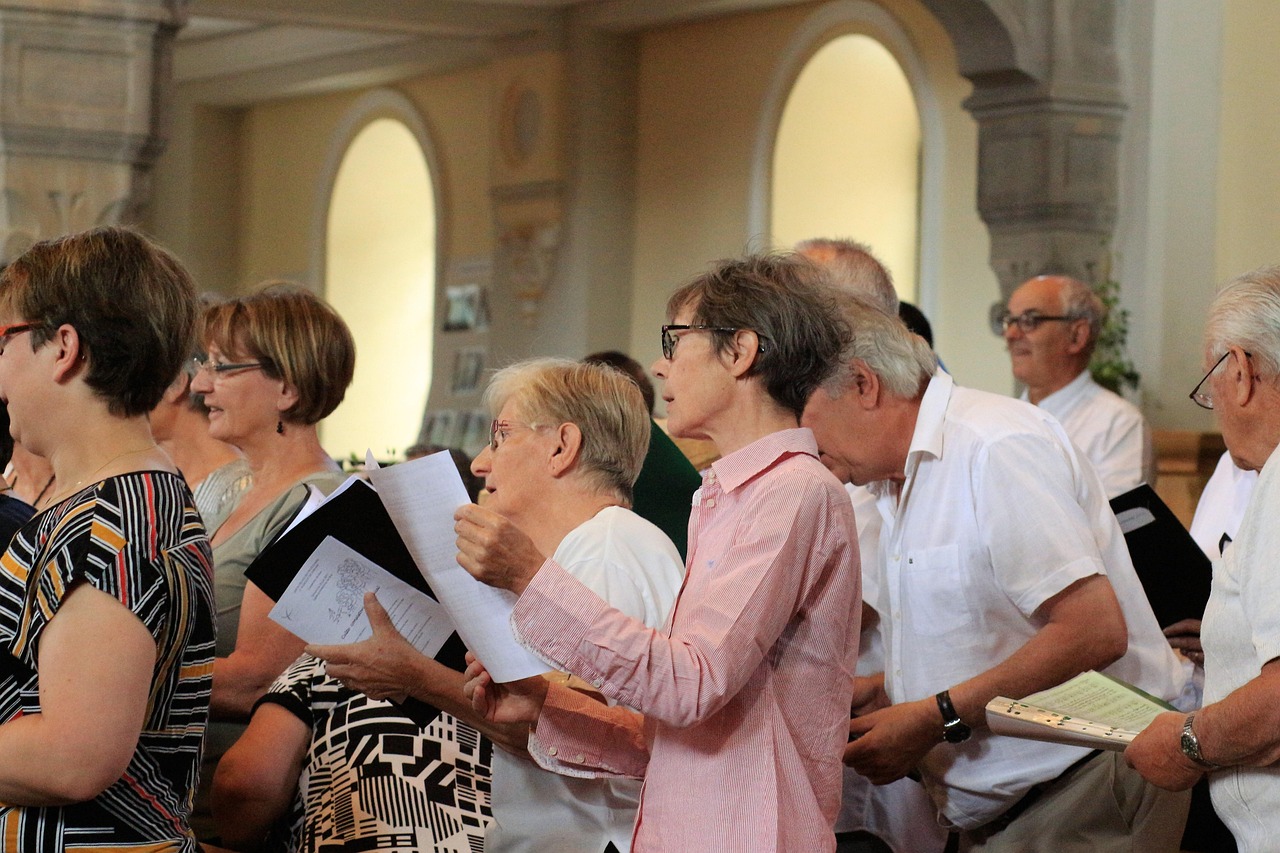
Songs of Praise and the nation’s favourite school hymn
This autumn the BBC has been in the process of discovering our favourite school hymn. It gave the public a shortlist of 50 hymns to choose from.
The vote was organised by the BBC’s Songs of Praise team, with an accompanying programme, The Big School Assembly Singalong, hosted by singer and presenter Aled Jones.
Aled Jones well remembers his school hymn days. “Every morning, we sat cross-legged on an uncomfortable wooden floor, which doubled up as our gym and school canteen.
“We would sing the songs that don’t get sung in cathedrals, where I ended up, because they’re perhaps seen as child-like, but actually that’s what brought me into religious music in the first place
.
“There’s a joy in being able to sing these hymns that uplift you and make you feel out of this world, but back at school, it was even better to do it with mates. I think that these hymns and this collective singing just takes you back to an easier, simpler, safer time.”
The vote was cast on 20th September, but at the time of this going to press, we do not yet have the results.
The results were due to be announced on 11th October, during the The Big School Assembly Singalong, held at the Victoria Hall in Bolton. On the night, a choir led by music teacher and TikTok star James B Partridge will present a range of school assembly classics.
Partridge said: “I think the school assembly songs that we sang as children have a special place in our heart. Having that experience of singing together as a community really brings back the joy of those childhood days.”
Here is a full list of the hymns that the BBC offered. Which are your top five?
All Creatures of Our God and King - All Things Bright and Beautiful - Autumn Days - Bind Us Together
Black and White (The Ink is Black, the Page is White) - Cauliflowers Fluffy (Paintbox) - Colours of Day (Light up the Fire) - Conkers!
Cross over the Road - Do not be Afraid, for I Have Redeemed You - From the Tiny Ant - Give Me Oil in My Lamp (Sing Hosanna)
Glad that I Live am I - Gloria in Excelsis Deo (Clapping Gloria) - God Knows Me (There are hundreds of sparrows, thousands, millions…)
Go Tell It on the Mountain - He’s Got the Whole World (He’s Got the Whole World in his Hand) - He Who Would Valiant Be (To Be a Pilgrim)
If I had a Hammer - If I were a Butterfly - I, the Lord of Sea and Sky (Here I am Lord) - I Watch the Sunrise - Kum ba yah (Kumbaya)
Lord of all Hopefulness - Lord of the Dance - Make Me a Channel of Your Peace - Mine Eyes have seen the Glory of the coming of the Lord
Morning has Broken - My Lighthouse - Oh Jesus I have Promised - One More Step (One More Step Along the World I Go) - Peace, Perfect Peace
Praise Him (Praise him in the morning) - Shine, Jesus, Shine - Sing it in the Valleys - Spirit of God as Strong as the Wind - Thank you, Lord
The Building Song (All Over the World) - The Lord’s my Shepherd - The Wise Man Built his House upon the Rock
Think of a World (Think of a World without any Flowers) - This Little Light of Mine - Water of Life - We are Climbing - We Plough the Fields and Scatter
When a Knight Won his Spurs - When I Needed a Neighbour - Who put the Colours in the Rainbow? - Who’s the King of the Jungle?
You Shall Go Out with Joy - ‘All are welcome’
The Methodist Church has released a new recording of the hymn ‘Let us build a house where love can dwell’, known to many as ‘All Are Welcome’. More than 140 Methodist churches contributed their voices to the project.
The hymn is intended as a response to the recent protests in London, the disorder outside the accommodation of those seeking asylum and the ‘Raise the Colours’ campaign.
Ben Lawrence, Digital Content Producer at the Methodist Church commented, “Many people have been made to feel, not just unwelcome, but frightened and intimidated by what is happening. We want this to be a song of reassurance, friendship and understanding.”
_______________________________________________________

When there is no peace
They dress the wound of My people as though it were not serious. “Peace, peace,” they say, when there is no peace. (Jeremiah 6:14)
I wonder what peace felt like in 1945, after 9th May or 16th August? These, of course, were the days after Victory in Europe Day and then Victory in Japan Day. Once the parties and hangovers were cleared up, life would go on as before, for many months to come: with shortages, rationing, men overseas, houses bombed and people on the move. On the continent and in the Far East it was much worse.
What does it feel like now? Yes, we have had ‘peace’ of sorts in most of Europe between the major continental powers for decades, which is an achievement, but there is no peace in Ukraine, the Middle East or Sudan. If anything, the world is now looking to be a more dangerous place.
This verse from the prophet Jeremiah was the theme of a sermon recently. The preacher talked about peace making, peace keeping and a lasting peace, which are not the same and require different skills. In and after the Second World War peace making meant winning the war and defeating evil. Peace keeping was occupying the defeated lands until they could establish communities built on democracy and justice. (The preacher was born exactly nine months after either VE or VJ Day, so he was a ‘child of peace’!)
What about a lasting peace? Many world leaders say, “Peace, Peace” but they mean only peace on their termsand do not care about anything else.
As Christians we should:
Pray for the peace makers: the women and men in the forces
Pray for peace keepers: the experts helping to build new societies
Pray for lasting peace: the willingness of world leaders and politicians to act for the greater good.
_________________________________________________________
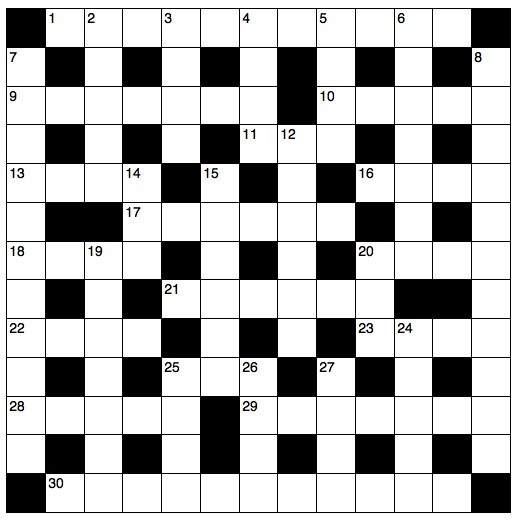
November Crossword
CLUES
Across
1 The sixth disciple (Matthew 10) (11)
9 ‘But deliver us from the — — ’ (Matthew 6) (4,3)
10 Love intensely (Song of Songs 1) (5)
11 From Mt Carmel to Jezreel, Elijah — all the way (1 Kings 18) (3)
13 One of the Midianite leaders who was captured and killed (Judges 7) (4)
16 Metallic element (4)
17 At line (anag.) (6)
18 ‘Cursed is everyone who is — on a tree’ (Galatians 3) (4)
20 Where Samson killed a thousand Philistines (Judges 15) (4)
21 He succeeded Moses (Deuteronomy 34) (6)
22 ‘When he saw him, he took — on him’ (Luke 10) (4)
23 ‘For — is the gate and broad is the road’ (Matthew 7) (4)
25 ‘The god of this — has blinded the minds of unbelievers’ (2 Corinthians 4) (3)
28 Fear or terror (Psalm 31) (5)
29 ‘For we all — of the one loaf’ (1 Corinthians 10) (7)
30 Assyrian ruler assassinated by his sons (2 Kings 19) (11)
Down
2 ‘So in Christ all will be made — ’ (1 Corinthians 15) (5)
3 ‘After supper he — the cup’ (1 Corinthians 11) (4)
4 ‘Come — to Macedonia and help us’ (Acts 16) (4)
5 He disobeyed his father Judah (Genesis 38) (4)
6 I veto me (anag.) (7)
7 Fourth king of Judah (1 Kings 15) (11)
8 Priest of God Most High, who blessed Abram (Genesis 14) (11)
12 ‘I have made you — — for the Gentiles’ (Acts 13) (1,5)
14 Implore (1 Samuel 15) (3)
15 ‘Out of the — , something sweet’ (Judges 14) (6)
19 ‘ I do — — a man’s understanding’ (Proverbs 30) (3,4)
20 ‘Because you are not under — , but under grace’ (Romans 6) (3)
24 Native of, say, Baghdad (5)
25 The last word in the Bible (Revelation 22) (4)
26 Heroic tale (4)
27 ‘Then you will know the truth, and the truth will set you — ’ (John 8) (4)
Answers to October Crossword
ACROSS: 1, Jehoiachin. 7, Endured. 8, Eased. 10, Rash. 11, Startled. 13, Easier. 15, Rubric. 17, Impurity. 18, Feet. 21, Eye at. 22, Ready to. 23, Holy Spirit.
DOWN: 1, Judas. 2, Harm. 3, Is duty. 4, Cheerful. 5, Insular. 6, Jezreelite. 9, Dedication. 12, Secretly. 14, Supremo. 16, Stir up. 19. Egypt. 20, Hair.
Winner
Crosswords reproduced by kind permission of BRF and John Capon, originally published in Three Down, Nine Across, by John Capon (£6.99 BRF)
___________________________________________________
November Anagrams
FRESHWATER FISH
Rearrange these letters to form the names of 10 kinds of freshwater fish found in UK waters. Answers may consist of one or two words.
1. HARCO 2. AMBER 3. KEPI 4. C BLACK KITES 5. ME VIRAL PERRY 6. E GUNDOG 7. CENTH
8. RABBLE 9. ANGGRILY 10. WOT TORN RUB
Compiled by Peter Warren
_____________________________________________
October Anagram Answers
UNESCO World Heritage Sites:
Answers
1. STONEHENGE 2. ENGLISH LAKE DISTRICT 3. FORTH BRIDGE 4. CANTERBURY CATHEDRAL 5. SALTAIRE
6. IRONBRIDGE GORGE 7. GIANT'S CAUSEWAY 8. FOUNTAINS ABBEY 9. DURHAM CASTLE AND CATHEDRAL
10. JODRELL BANK OBSERVATORY 11. DERWENT VALLEY MILLS
Winner: Wyn Hirst
___________________________________________________
November Soduko Puzzle

October Sodoku Solution

Winners Jack Thompson
____________________________________________________
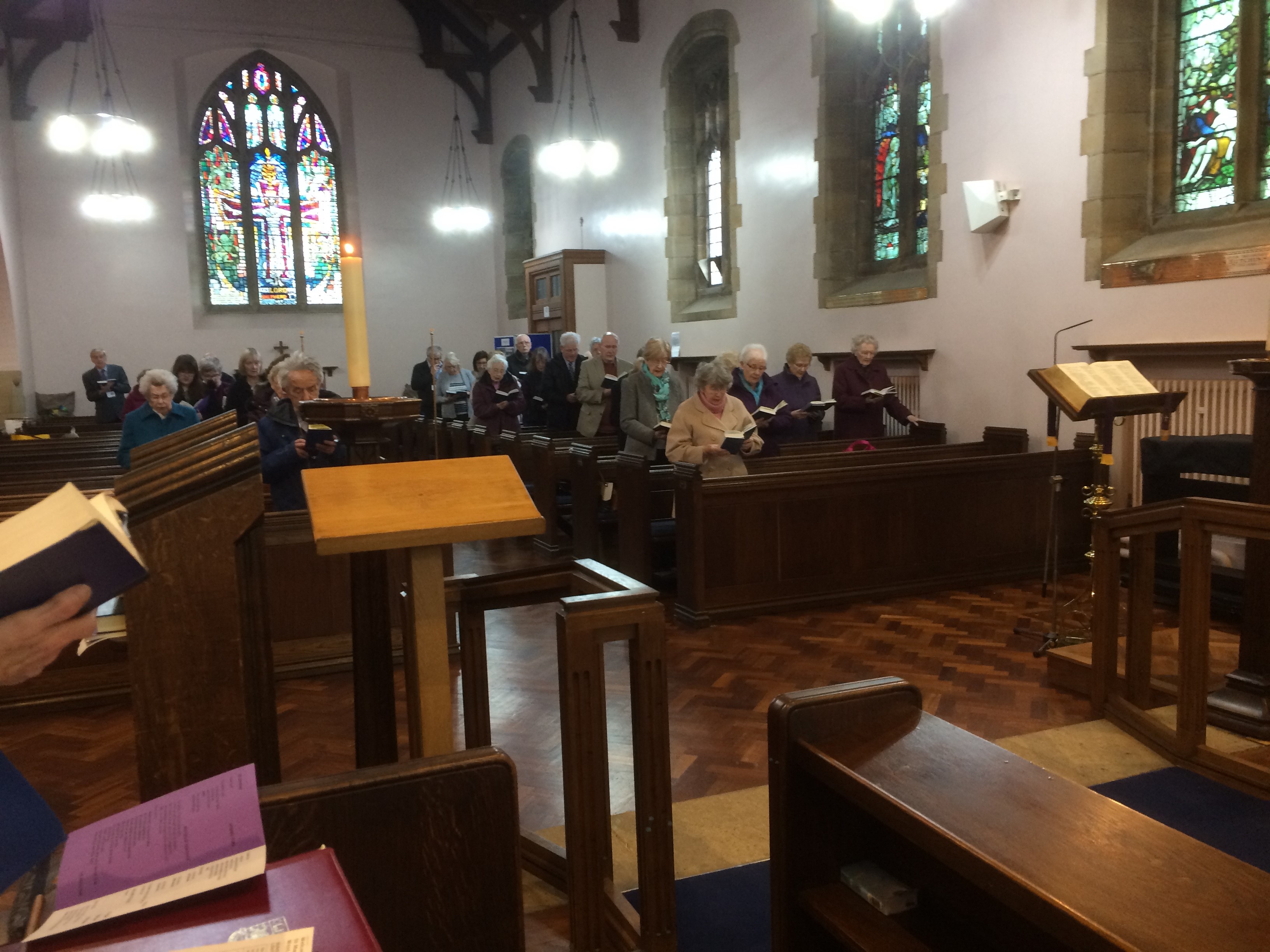
The Revd Dr Jo White considers how little we read the bible.
Reflecting Faith: Do we hear God's word today?
For the last few months, we’ve been looking at the way that church services are put together. After the Gloria each week, this we hear ‘God’s Word’ as written in the Bible. This is usually three passages: one from the Old Testament, one from the epistles, and one from the gospels.
But how much do we hear of God’s Word? Though we say we want to ‘hear God’s word’, actually the amount we hear week on week is quite minimal.
In bygone days, when the 1662 Book of Common Prayer was universally used in churches, it brought with it a two year lectionary: (unlike today’s three year lectionary: lectionary being the recommended or obligatory Bible readings for each day).
This gave congregations, if they came to daily services both morning and evening (which in those times they most likely did) during the course of a year, an opportunity to hear read the whole Old Testament once, the New Testament twice and all the Psalms twelve times.
What a contrast to today! In most UK churches, attendance is now at only one service each week, mostly on Sunday. During that service, perhaps 15 or 20 Bible verses might be read.
Now, there are around 31,100 verses in the Bible, which means that at a generous 30 verses a week the congregation will hear around 1,560 verses in a year – that’s around 5% each year. So even on a three-year cycle, with a few extra readings for good measure, we hear no more than 20% of the Bible.
I suspect there are two key reasons for this diminution of Bible verses being read. Firstly, church services have got shorter and take up far less time.
Secondly, congregations have become more literate, and so it is thought that they do not need it all read out to them.
It would be interesting to know how much of the read-aloud-Bible people heard and listened to and absorbed, in relation to how much do that today, with the shorter verses being read to them coupled with much shortened sermons.
This month
Next time you go to a Sunday church service listen to the Bible reading with keen ears. How much do you recall a few days later? How much of the Bible that you have not heard recently in church have you read for yourself?
__________________________________________________
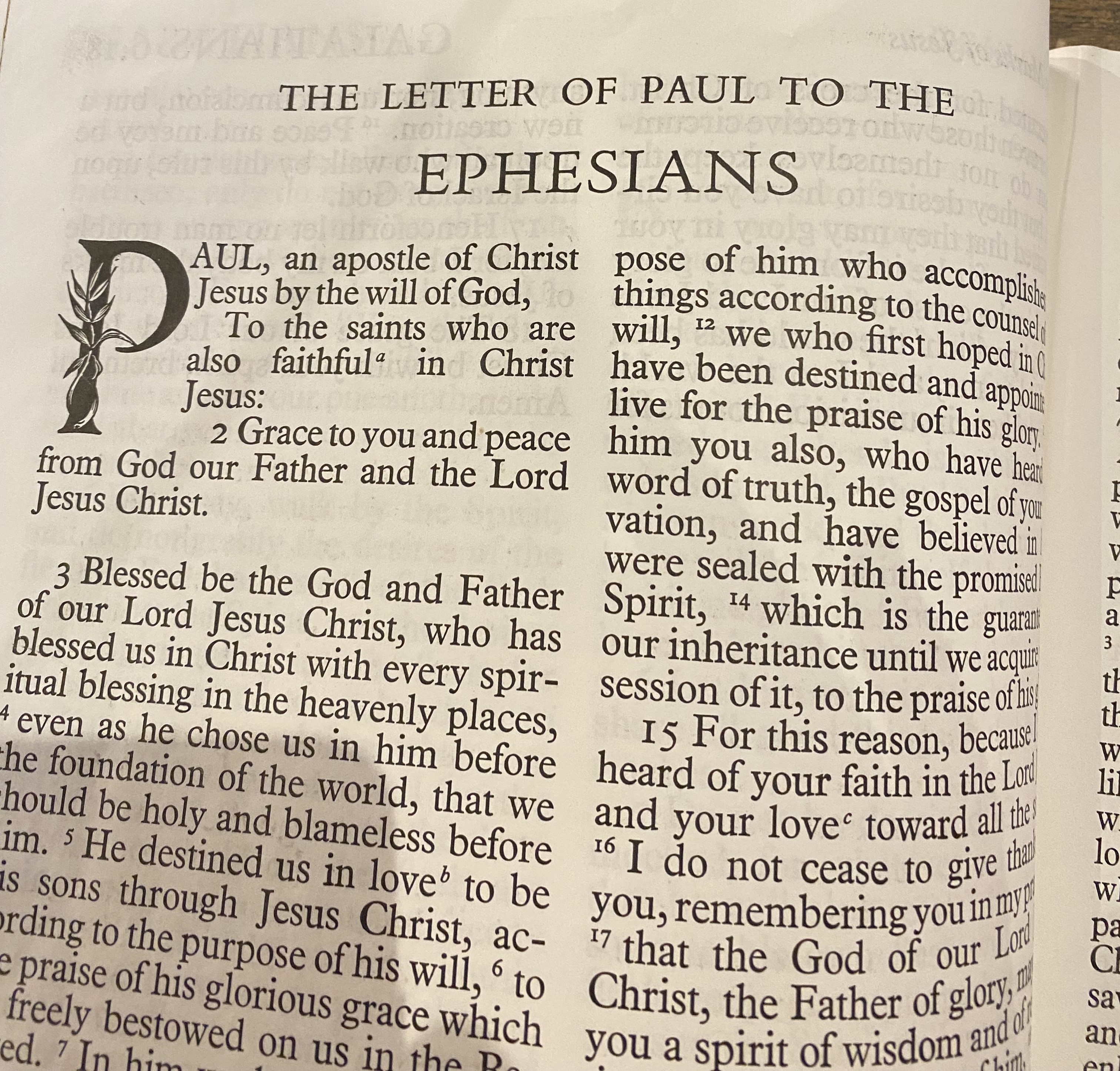
Canon Paul Hardingham continues his series on the books of the Bible, which will run until the end of 2025.
What’s the Big Idea? – An Introduction to the
books of the New Testament: Ephesians.
Paul wrote the letter of Ephesians around AD 60, while in prison at Rome. It was probably a circular letter to be read in the house churches of Ephesus and the local area. Paul founded the church over a period of three years (Acts 19:1-20:1) between 52-55 AD. Ephesus was the leading city and commercial centre in the region, famous for its temple to the goddess Artemis (Diana).
Paul’s aim in writing his letter was to help his readers understand the dimensions of God’s purpose and grace for them and His eternal plan for the church. The believers needed to understand their status ‘in Christ’ and the call to live a life worthy of Christ. Ephesians is divided into two halves: chapters 1-3 concern theological issues, while chapters 4-6 deal with the practical outworking of faith.
Having shown God’s purpose for the church, Paul shows how God has reconciled individuals to Himself by grace (2:1–10). He has reconciled people to each other by breaking down the barriers through Christ’s death (2:11–22). This is the ‘mystery’ revealed by Paul (3:1–13) and he shows how Christ’s gifts promote unity and maturity (4:1–16). The believer’s new life stands in contrast to the old way of life without Christ (4:17—6:20).
The great overarching theme of the letter is that we are rescued by God not just for our personal benefit, but to bring praise and glory to Him in our lives:
‘He made known to us the mystery of His will according to His good pleasure, which He purposed in Christ, to be put into effect when the times reach their fulfilment – to bring unity to all things in heaven and on earth under Christ.’ (1:9,10).
___________________________________________________
We continue with this new series, and is by the Revd Dr Herbert McGonigle, formerly of the Nazarene Theological College, Manchester
Praying with the Prayers Of The Bible - When your prayer is not answered
2 Cor. 12:8; ‘Three times I asked the Lord about this …but…’
Paul is talking about one of the most mysterious and one of the most baffling aspects of prayer – when God does not say yes.
On the face of it, Paul’s prayer was very modest. For some time he had been troubled by ‘a thorn in the flesh.’ He doesn’t tell us what the ‘thorn’ was and down the centuries theologians and commentators have made suggestions. Most of them have thought that the affliction was physical because Paul says it was ‘in the flesh.’ Some have suggested that he suffered from epileptic fits which caused him to fall down, while others have suggested that he was laid low by constant fevers or that he had very poor eyesight, the last based on his remarks in Galatians 6:11.
But in spite of this great servant of the Lord praying earnestly three times that the thorn would be removed, God did not answer as Paul expected. A number of things in this passage (verses 7-10) are very helpful to all of us in the matter of prayer.
First, although God’s answer was not what Paul asked for, God did answer him. God is never indifferent to the prayers we utter from the depth of our heart. Unlike the idol Baal in the Old Testament story about Elijah, (1 Kings 18) the God and Father of our Lord Jesus is not on a journey, nor is he busy elsewhere, nor is he sleeping. He hears our prayers and our cries when we come to Him in our need and pain and distress.
Second, although Paul did not get the answer he wanted, God made him a wonderful promise. He said, ‘My grace is sufficient for you’ (v.9). This was not what Paul asked for, yet what a promise it was! God said in effect. ‘I will not take the thorn away – but my daily grace is all-sufficient.’ In spite of the thorn, Paul will triumph. When God gives us all-sufficient grace, it will take care of everything in our lives.
Thirdly, Paul learnt that God’s wonderful grace meant that in his weakness ‘the power of Christ’ (v.9) would be with him, the power that would make him effective and fruitful in his ministry.
Fourthly, this experience taught Paul that he could be ‘content with weaknesses and insults’ (v.10) because it was for Christ’s sake, and when he is weak in himself, he is strong in Christ (v.10).
So what about unanswered prayer? Unless our prayer was selfish and not for our good in the first place, God does answer our cry. When the answer is not what we expected, then it means that our loving Father has something for us even better and more important than what we asked for.
____________________________________________________________

Take it easy on those country roads
Country roads may look inviting to drive, but the statistics tell a different story. For collisions on rural roads are around four times more likely to result in a fatality.
Such is the finding of the NFU Mutual Rural Road Safety Report 2024. It found that in 2023, an average of one in every 32 collisions on rural highways resulted in a death, compared to one in every 122 on urban roads. Overall, more than 18 people died on rural roads each week in 2023.
So – what is wrong? It seems it is the sheer number of hazards which motorists may face on a rural road. These include blind corners, narrow roads, road quality, poor visibility, cyclists, pedestrians, horse riders, mud and debris, loose livestock, agricultural vehicles, unexpected road or field entrances, impatient drivers, and Sat-Navs sending people down unsuitable roads.
It all adds up to one simple message: be careful and expect the unexpected on country roads.
____________________________________________________________
The best time to plan your funeral is … NOW!
November is when we remember the dead (All Saints and Remembrance). But what about your own funeral?
It will happen sometime, whether soon or years in the future. Some preparation by you now will save your loved ones a lot of uncertainty later. So, this month, why not spend some time thinking about what you want for your own funeral?
Most funerals in England are Christian, though the officially recorded number of Church of England funerals tends to be limited to those which are conducted by parish clergy and Readers. The minister at others may be retired, or a hospital or military Chaplain.
A few funeral events are led by nominees of the British Humanist Association or the National Secular Society. A growing number are conducted by civil celebrants, who tend to devise a format concentrating on the story of the person who has died, with God as an afterthought, though Christian prayers or texts from other religions may be incorporated.
Parishioners may not realise that they have the right to the services of the Vicar, even if they don’t go to church. They also have the right to be interred in the churchyard if it is open for burials.
The trend in funerals at the moment is to make them a celebration of the life of the deceased person. Although your wish – and that of your family – may be to make your funeral a joyful occasion, it does no one any good to suppress grief. A Christian service should make room for sadness as well as gratitude. It is also an act of worship, in which reverence should be paid to God, the source and goal of life. His judgment, generosity and mercy and the Christian hope in resurrection through Jesus Christ should be central.
A sensitive funeral service will also help mourners to contemplate the most fundamental issues of our existence. The Christian hope can be an unexpected encouragement, not least when people claim to have little faith of their own.
You can talk all this over with your Vicar in confidence. You don’t have to be terminally ill to do so! He or she knows you are precious to God and will be able to explain all the options and share some ideas.
Now for some practical considerations:
First of all, if you are an organ donor, where can your consent form be found?
(Find out more from  https://www.organdonation.nhs.uk
https://www.organdonation.nhs.uk
Do tell your Executor and next of kin where your Will is kept. Details of your funeral wishes can be kept with it or in a more accessible place. It is useful to maintain a list of family, friends, neighbours, acquaintances and former colleagues who should be notified of your death and the funeral arrangement.
IT’S YOUR FUNERAL – Check List
You may like to fill in the blanks below and keep these pages.
Who is your Executor?
Which funeral director?
Cremation or burial?
If cremation, what do you want done with your ashes?
If burial, where?
Will it require re-opening an existing grave?
Do you want a headstone? Note: churchyard memorials must respect diocesan regulations.
Funeral Service: in church or crematorium, or both?
What sort of coffin? Wood, or an eco-friendly one (eg cardboard, bamboo, wicker)?
Do you want flowers, or donations to a (named) charity, or both?
Who should conduct the service?
Do you want someone else to give a tribute?
Would you like some of your favourite music played before and after the service?
What hymns and readings do you want?
Wake/reception: any suggestions for the place and type?
Is there anyone who needs to know that you have forgiven them?
Do you owe an apology to anyone?
_______________________________________

Help our woodlands
If you’ve been admiring the glories of autumn, and have any time to spare, why not consider volunteering to help the Woodland Trust, the UK’s leading woodland conservation charity?
The Trust looks after more than 1,000 woods and groups of woods. The Trust also campaigns to protect and save more ancient woodland from destructive development. It always needs volunteers to help in a wide variety of ways. For details, visit:  https://www.woodlandtrust.org.uk
https://www.woodlandtrust.org.uk
_______________________________________
Remembering Lord Tennyson
It was 175 years ago, on 19th November 1850, that Alfred, Lord Tennyson became Poet Laureate of the UK until his death in 1892. He succeeded William Wordsworth and became known as the poet of the Victorian age.
Born in Somersby, Lincolnshire, in 1809, he was one of 11 children of a mentally unstable and embittered clergyman. All the surviving children, some of whom were talented individuals, suffered at least one mental breakdown.
Tennyson wrote poetry from a very early age and used it as a distraction. It was not until he went to Trinity College, Cambridge that he became happy, partly because he was popular there and partly because of the close four-year friendship he struck up with the brilliant Arthur Hallam, who sadly died young.
In the 1830s and 40s Tennyson published many poems and was granted a £200 pension by the Prime Minister, Sir Robert Peel, but it was in 1850 that everything changed: he married Emily Sellwood – an author in her own right – and the elegies on Hallam that he had been writing over the years were published as In Memoriam, to great acclaim from reviewers, public and Queen Victoria herself, leading to his appointment as Poet Laureate.
He and his wife moved to the Isle of Wight, and for the rest of his life he lived there or in Surrey. He was granted a peerage by Gladstone in 1883. His accumulated poetry, admired technically for its imagery, verbal dexterity and underlying melodies, came to epitomise the age he lived in, where established Christian faith was challenged by scientific doubt.
Towards the end of his life there was criticism of his style from newer schools of poetry, but a more balanced view now prevails, with a widespread recognition of his greatness.
_________________________________________________________
For how many minutes can you concentrate?
Most of us can watch television for only about 15 minutes, or read a book for about 14 minutes, before we lose our concentration. Most of us blame our social media notifications as the reason.
A recent survey by Perspectus Global for Lingo by Abbott, found that Instagram, Facebook, WhatsApp and message alerts were named as the main culprits.
Overall, it seems we can focus for only 11 minutes on a virtual work call, or 13 minutes in a face-to-face meeting, or 12 minutes writing a work email.
We even seem to lose concentration at family gatherings, after only 14 minutes. Overall, four in five of us say that we get distracted easily, and that we lose our focus around eight times each day.
What about you? Why not take up the challenge, and ‘time’ your losses of concentration for a day?
________________________________________________
George Bernard Shaw – the man who wrote Pygmalion
Seventy-five years ago, on 2nd November 1950, George Bernard Shaw, Irish playwright and literary critic, died. Best known for Pygmalion, he was winner of the 1925 Nobel Prize in Literature and co-founder of the London School of Economics.
Shaw, who was born in Dublin of English Protestant descent in 1856, was a failed novelist before becoming widely regarded as one of the most significant of British dramatists; he was also a very successful literary critic and prominent socialist, being one of the four founders of the Fabian Society.
Perhaps his most famous play, Pygmalion, was adapted into the extremely popular Broadway musical, My Fair Lady. But although Shaw wrote many famous and popular plays – more than 60 altogether – he remained enigmatic as to his beliefs. Describing himself at first as an atheist, by the early 20th century he was calling himself a mystic. In 1913 he said he was not religious “in the sectarian sense” but aligned himself mysteriously with Jesus as “a person of no religion”.
Through his plays he promoted the idea that mankind was on an evolutionary path. He was regarded as a champion of feminism and inveighed against religious hypocrisy (Major Barbara), inhuman forces like the Church and the Law crushing superior beings
(Saint Joan), and false religion (Androcles and the Lion).
In his essays, reviews and lectures he seemed to enjoy being contentious. He denounced both sides in the First World War, but later expressed admiration for Mussolini and Stalin. He opposed vaccination and promoted eugenics and alphabet reform. After his death a Shavian alphabet was created by enthusiasts.
Bernard Shaw (as he preferred to be known) had no children, although he was married to Charlotte Payne-Townshend, a wealthy Irishwoman and champion of women’s rights. There is a strong suspicion that the marriage was unconsummated.
________________________________________________________
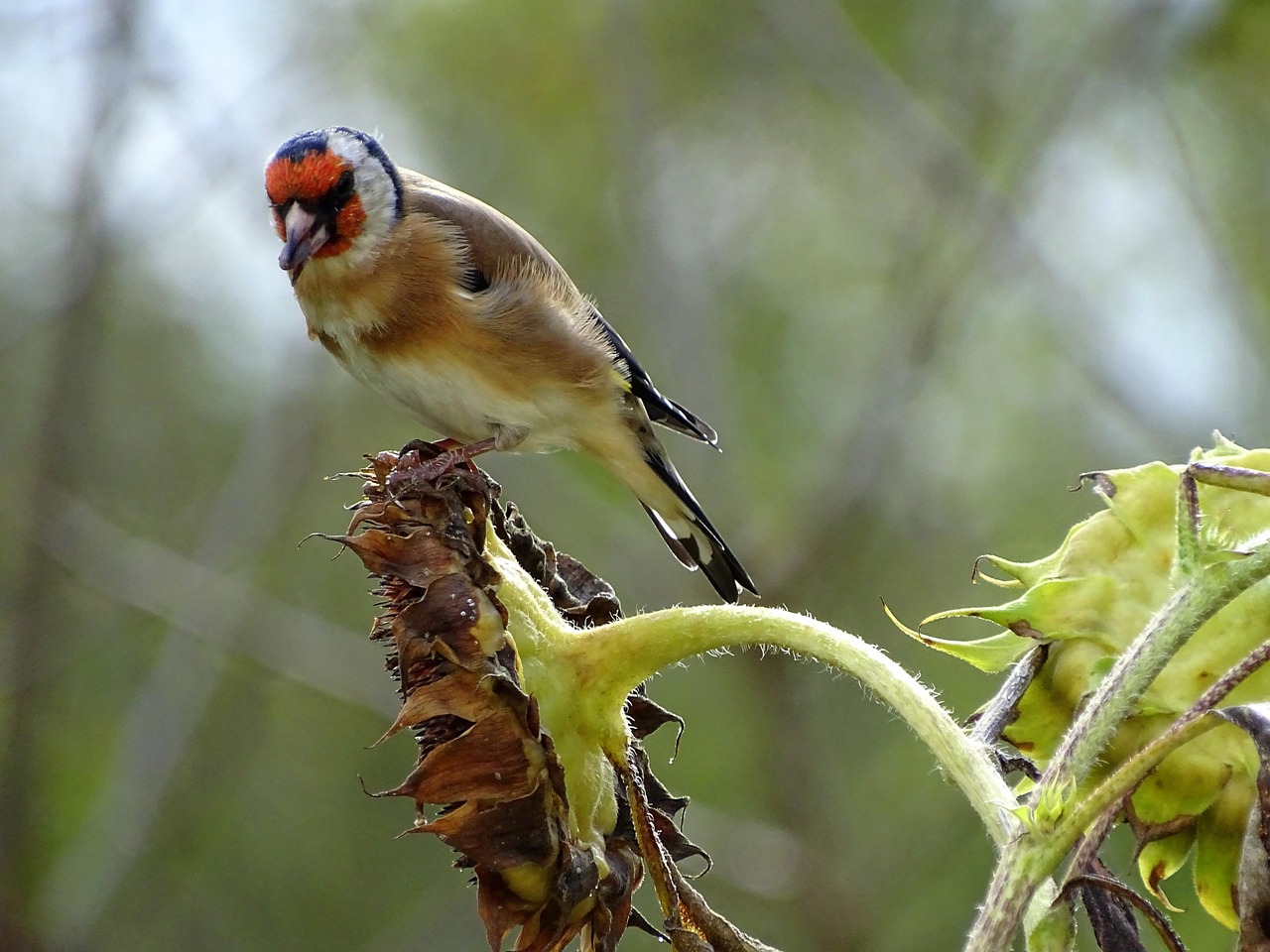
Leaf some green stuff in the garden
The clocks have gone back, and we are putting our gardens to sleep for the winter. But this autumn, when you tidy up, do not tidy away too much. Many insects and wild creatures will be relying on some ground cover or hideaway to call ‘home’ for the winter. Several piles of twigs or pruning, left around your garden in discreet places, will provide a great winter ‘snugs’ for toads, grass snakes and other small garden inhabitants. ‘Spent’ seed heads provide cover and food for birds over the winter.
Above all, before you light any bonfires on 5th November, take care there are no hibernating hedgehogs inside!
_______________________________________________________
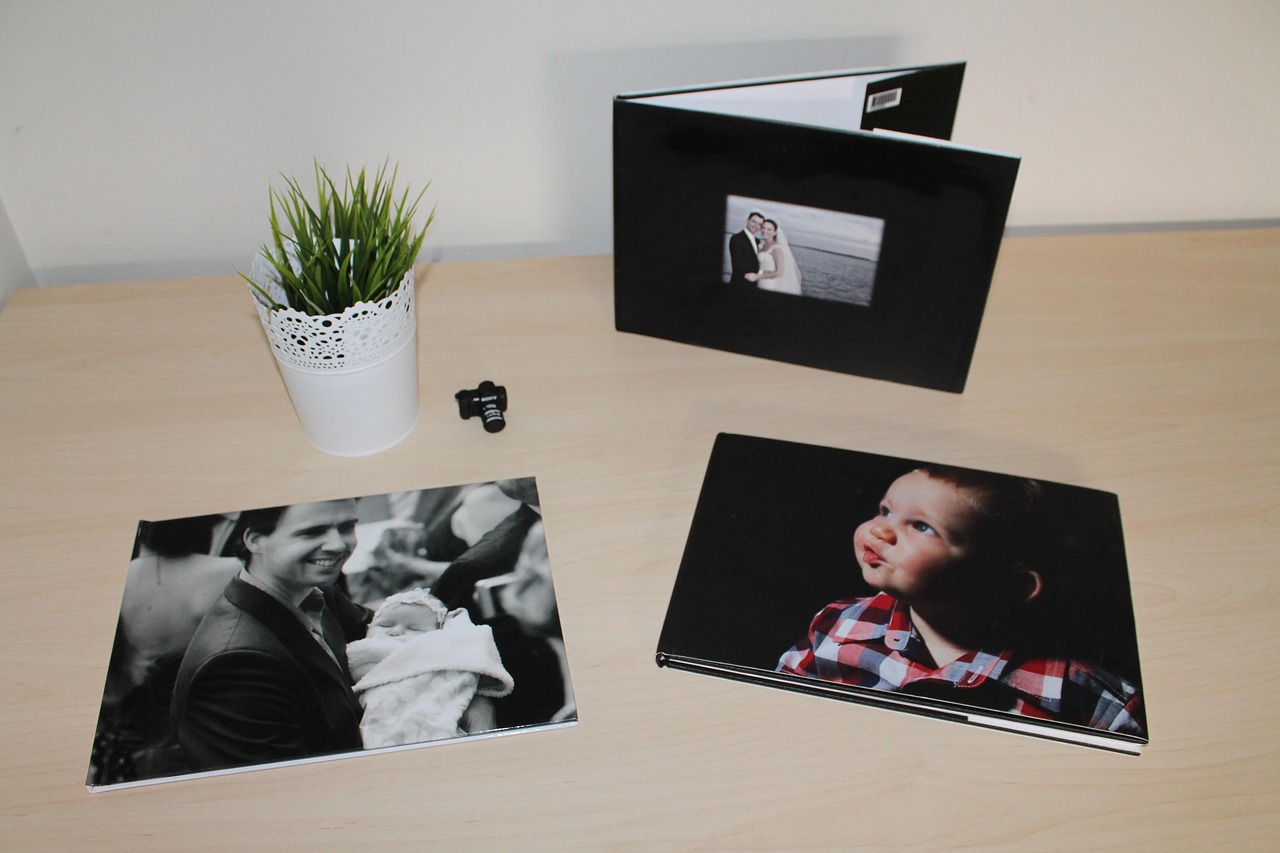
Put together a Memory Book
Do you have grandchildren? Then this winter, during those long dark days, why not spend some time putting together a sort of scrapbook of memories to pass on to them?
Things you might like include could be: where you lived when you were a child; what your school was like, what games you most enjoyed, who your best buddies were, what pets you had, what your first job was, and how you met your partner. What was your first car, and where was your first home as an adult? Add a selection of photographs that you have from the past.
__________________________________________________
by Canon Paul Hardingham
St Andrew and football
‘Some people think football is a matter of life and death. I don’t like that attitude. I can assure them it is much more serious than that’ (Bill Shankley). When you replace the word ‘football’ with ‘mission’, this quote still has something to say! The apostle Andrew (we remember him on 30th November) demonstrates what the mission of the Church is all about (cf John 1:35-42). It’s not unlike following your favourite football team!
When we support a football team, we make sure that we know all about them! When Andrew and his friend heard about Jesus, they wanted to find out more: ‘Look, the Lamb of God.’ (John the Baptist, v35). The first stage of mission is finding out more about Jesus, the One who enables us to be friends of God through His death and resurrection.
Secondly, when supporting a football team, we will spend time watching their games. Andrew asked, ‘where are you staying?’ and Jesus replied, ‘Come and you will see’ (v39). Andrew spent the rest of the day talking and listening to Jesus. As a result of this time, he had something to share. How much time do we spend with Jesus, reading His word and praying?
When our team wins, we want to share the good news! After meeting Jesus, Andrew’s first action was to tell his brother Peter: ‘We have found the Messiah’ (that is, the Christ)’ (v41). Are we willing to tell others about Him too? Sharing with family and close friends can sometimes be harder than talking with strangers. However, we don’t need to follow a football team to engage in mission. It’s all about being excited to share Jesus with those we meet day by day.
‘Mission is seeing what God is doing and joining in’ (Rowan Williams).
Our series on the Nicene Creed concludes this month, as Canon Paul Hardingham considers a bedrock of our Christian belief: that the Church has an eternal future.
The Nicene Creed: The Church and the Future
We believe in one holy catholic and apostolic Church. We acknowledge one baptism for the forgiveness of sins. We look for the resurrection of the dead, and the life of the world to come. Amen.
‘We believe in one holy catholic and apostolic Church’: The Creed affirms the four marks of the church, defining a truly orthodox Christian community:
one: despite the many different churches and traditions, there is only one Church to which we all belong. ‘There is neither Jew nor Gentile, neither slave nor free, nor is there male and female, for you are all one in Christ Jesus.’ (Galatians 3:28).
holy: the church is a holy community set apart for God (ekklesia, lit ‘called out’), whose mission is to reflect God’s holiness in worship and live out His love in the world.
catholic: this doesn’t refer to the Roman Catholic church, as the word means ‘universal’, reminding us of the unity of the church across the whole world and all denominations.
The church aims to apply the same gospel in whatever situation, context or culture it finds itself.
Apostolic: The apostolic ministry of the church (‘apostolos’) is one of being sent to communicate the good news of the gospel: ‘Therefore go and make disciples of all nations.’ (Matt 28.19).
‘We acknowledge one baptism for the forgiveness of sins’: As baptism is as sign of belonging to the church, it can only happen once. The issue addressed in the Creed is that of Christians who left during persecution, but wanted to be accepted back by rebaptism. It affirms the principle ‘one Lord, one faith, one baptism’ (Ephesians 4:5). Today, those baptised as children, theologically can’t be re-baptised to demonstrate an adult commitment. However, they can be confirmed or reaffirm their baptism vows.
‘We look for the resurrection of the dead, and the life of the world to come’: The Creed ends with a statement of hope, that we will share in Jesus’ resurrection life after death. It is not simply about the immortality of our soul, but the resurrection of our bodies. They will be transformed to fit us for life of heaven for eternity: ‘The body that is sown is perishable, it is raised imperishable…it is sown in weakness, it is raised in power; it is sown a natural body, it is raised a spiritual body.’ (1 Corinthians 15:42-44).
__________________________________________________
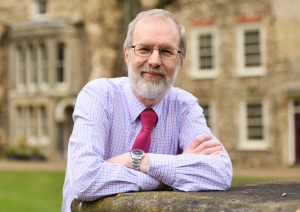
The parish Pump team.
Nigel Beeton was until his recent retirement an NHS radiographer working at the West Suffolk Hospital in Bury St Edmunds. He is also editor of ‘The View’, the parish magazine of St Mary with St Peter, Bury St Edmunds.To relax from these duties, he enjoys “messing around with words”, writing poetry ranging from the comic to the more reflective.
_______________________________________
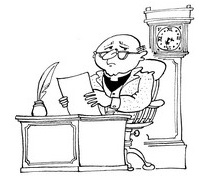
The Rectory
St James the Least of All
My dear Nephew Darren
I was intrigued that you have been nurturing someone called Dave who is considering ordination. Since Dave had never travelled outside the city, your decision to send him to me was understandable. Sadly, I don’t think he is cut out for the ministry.
We did our best. In a fit of hospitality, the Colonel invited this Dave to stay at the Lodge, and to join his Saturday pheasant shoot as a beater. But Dave said firmly that he was against beating any kind of bird and abhors all kinds of murder. It seems young Dave is a vegetarian! You might have warned us. The Colonel is now concerned that Dave is connected in some way with the Green Party. You cannot be too careful these days.
Then Miss Saxby and Miss Tarby stepped in. They enjoy mushrooming, and kindly took young Dave off to the woods. It is not their fault that they are a bit deaf and so did not hear his cries of distress when he lost them among all the trees. They just assumed he had gone back to the Colonel’s, and so of course they did not organise a search party until much later. Fortunately, the church warden’s spaniel has a keen nose and found Dave before midnight. During all that time, Dave seemed to have had nothing better to do than slide about on fallen leaves and trip over hidden logs in the dark. He was even babbling about having heard a crying ghost. We feared he might be delirious but then realised he meant the local owl. He also seemed surprised by the darkness and asked how we manage without any streetlights at all in the parish. We explained the obvious – we simply follow the example of the well-refreshed when leaving the pub, and feel our way along the walls.
On Sunday morning Dave rushed into the church to warn me that there were several loose sheep in the churchyard. I decided then that he should return to the safety of the city. There was no point in letting him near most of our church ladies, who would have savaged him on sight.
The visit only proves the obvious: potential ordinands should be carnivorous, cricketing fly-fishers, most at home in well-worn tweeds and preferably accompanied by a muddy dog. How else will they get along with normal folk?
Your loving uncle, Eustace
_________________________________________________
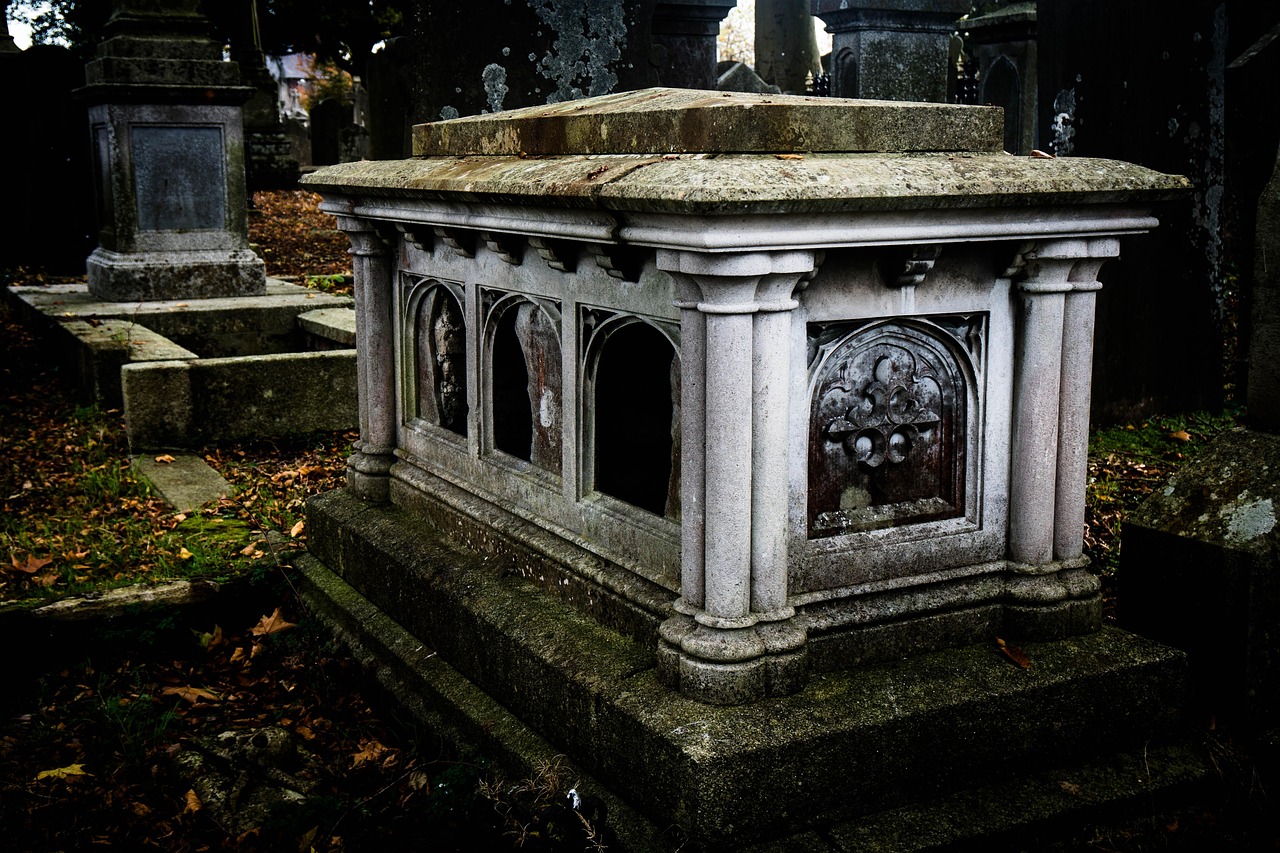
Conservation project launched to preserve ‘table top’ tombs
A Church of England-backed initiative has been launched to help with the preservation of thousands of stone monuments that feature in churchyards throughout the country.
There are believed to be more than 4,000 ‘table top’ tombs, many ornately carved, dating from the 17th to the 19th century, in Diocese of Gloucester churchyards alone, and many thousands more in churchyards across the country. The tombs are distinctive for their flat slab (the ‘table top’) supported by sides or upright legs.
A collaborative project based in the Diocese of Gloucester and supported by the Church of England’s Cathedral and Church Buildings team, with funding from The National Lottery Heritage Fund, is now assessing the conservation needs of the tombs.
The project will contribute to new national guidance on the care and maintenance of the tombs.
____________________________________________
Sullivan – of Gilbert and Sullivan
Some 125 years ago, on 22nd November 1900, Arthur Sullivan, the British composer, died. Best known for his collaborations with the dramatist W S Gilbert on light operas including HMS Pinafore and The Pirates of Penzance, he also wrote the music to the hymn Onward, Christian Soldiers.
Sullivan was born in 1832 in Lambeth. His Irish-born father Thomas was a military bandmaster, clarinettist and music teacher who, from 1845 to 1857 was based at the Royal Military College, Sandhurst, where his son became proficient on many of the band’s instruments and composed an anthem, By the Waters of Babylon, when he was eight.
Arthur was drawn to classical and spiritual music of various kinds, and his huge success with Gilbert was awkward for him, as he often felt – encouraged by certain reviewers and others – that he was “capable of higher art”. He was knighted by Queen Victoria in 1883, and the musical establishment felt this should end his involvement with comic opera.
Sullivan was inclined to agree, but he was also aware of the quality – and popularity – of his work with Gilbert. He had told an American reporter in 1879: “His ideas are as suggestive for music as they are quaint and laughable. His numbers … always give me musical ideas.”
By 1885 the duo had completed The Mikado, their most successful work, which ran for 672 performances.
Sullivan never married, though he had close relationships with a number of women, including the American socialite and singer Fanny Ronalds. He was devoted to his mother and also to his nephews and nieces after his brother Fred died at an early age.
Persistent kidney disease often meant that Sullivan had to conduct sitting down. He died of heart failure following bronchitis. His Te Deum Laudamus was performed posthumously.
___________________________________________________
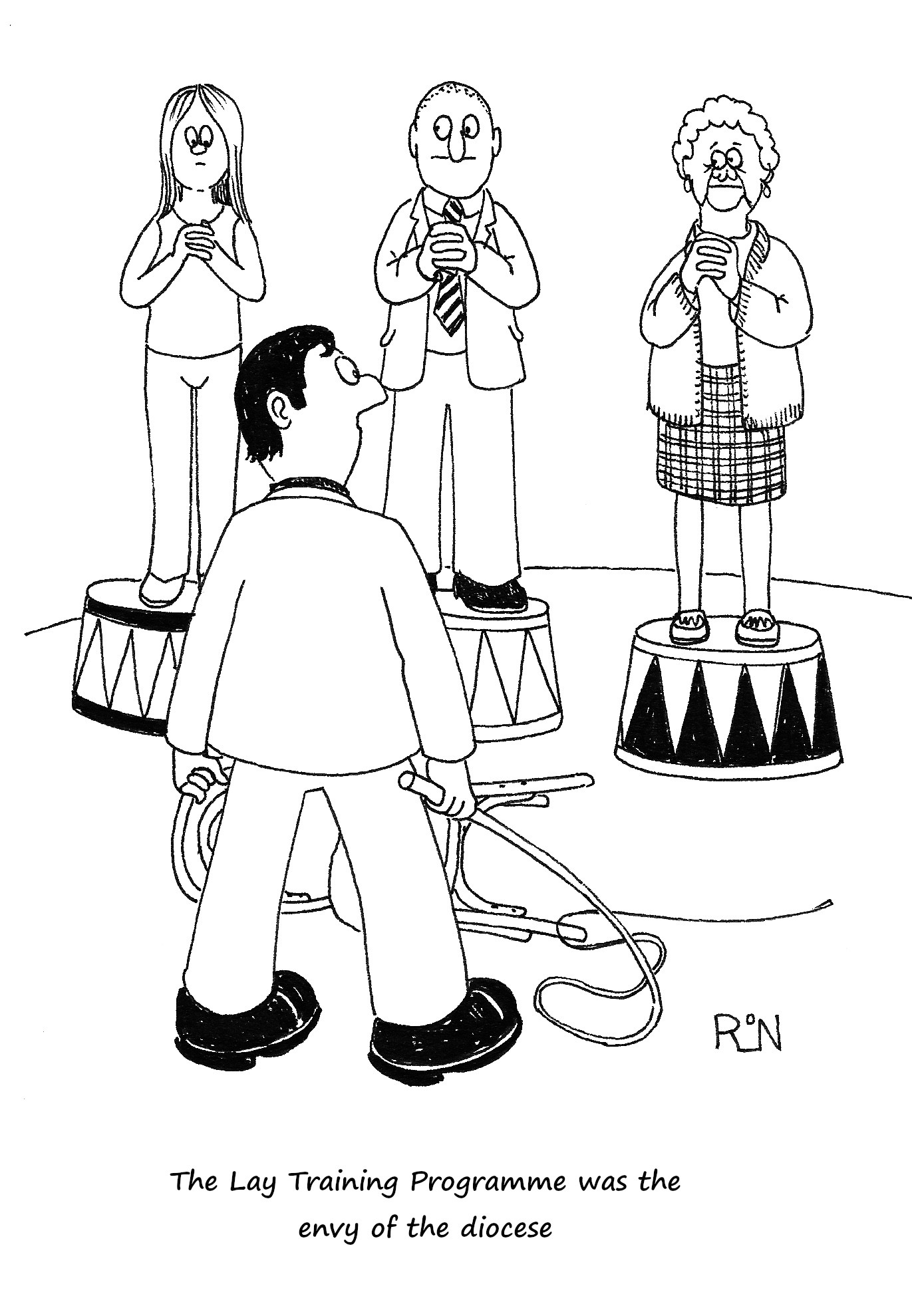
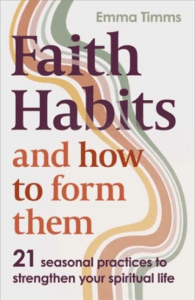
BOOK REVIEW
Donkey Roads and Camel Treks: A pilgrim’s guide for Advent – BRF Advent Book 2025
By Gemma Simmonds, BRF, £9.99
The lectionary readings for Advent speak of making a straight path towards God, but many of us find our own route decidedly winding. Biblical characters in the story of the incarnation are called to set out on the road to discipleship using any means of carriage they can. This book offers user-friendly encouragement (with the occasional spur onwards) to explore what helps and what hinders us in this journey to deeper encounter with the flesh and blood God whom we find in scripture, in our lived experience and in the least of His sisters and brothers.
_________________________________________
All in the month of November.
It was:
175 years ago, on19th November 1850 that Alfred, Lord Tennyson, became Poet Laureate of the UK (until 1892).
125 years ago, on 22nd November 1900 that Arthur Sullivan, British composer, died. Best known for his collaborations with the dramatist W S Gilbert on operas including H.M.S. Pinafore and The Pirate of Penzance. He also wrote the hymn Onward, Christian Soldiers.
100 years ago, on 10th November 1925 that Richard Burton, Welsh stage and film actor was born. Known for Cleopatra, Who’s Afraid of Virginia Woolf? And many more. Fifth and sixth husband of Elizabeth Taylor. Died 1984.
Also 100 years ago, on 27th November 1925 that Ernie Wise, TV comedian and actor, was born. Best known for his comedy partnership with Eric Morecambe (Morecambe and Wise) Died 1999.
90 years ago, on 6th November 1935 that Britain’s Hawker Hurricane fighter plane made its first flight. It played a major role in WWII, especially during the Battle of Britain.
80 years ago, on 16th November 1945 that UNESCO, the United Nations Educational, Scientific and Cultural Organisation, was founded.
75 years ago, on 2nd November 1950 that George Bernard Shaw, Irish playwright and literary critic, died. Best known for Pygmalion. Winner of the 1925 Nobel Prize in Literautre, and co-founder of the London School of Economics.
65 years ago, on 2nd November 1960 that a British jury cleared Penguin Books of obscenity for publishing D.H. Lawrence’s novel Lady Chatterley’s Lover. This is often considered the beginning of the permissive society in Britain.
Also 65 years ago, on 8th November 1960, that John F Kennedy was elected as the 35th President of the USA.
60 years ago, on 9th November 1965 that the death penalty was abolished in the UK
50 years ago, on 3rd November 1975 that Britain’s first North Sea oil pipeline was officially opened.
40 years ago, on 15th November 1985 that the Anglo-Irish Agreement was signed by the Prime Minister Margaret Thatcher and Irish President Garret Fitzgerald. It gave the Irish government a consultative role in the affairs of Northern Ireland.
30 years ago, on 20th November 1995 that Princess Diana admitted that she had committed adultery, and spoke openly about her separation from the Prince of Wales in a frank interview with the BBC. In 2021, BBC journalist Martin Bashir was accused of using deception, including fake bank statements, to persuade her to give the interview.
25 years ago, on 9th November 2000 that Eric Morley, TV host, died. Known for establishing the ballroom dancing competition Come Dancing (1949 – 98). It was succeeded by a celebrity version, Strictly Come Dancing, in 2004.
20 years ago, on 30th November 2005 that John Sentamu became Archbishop of York (until 2020). He was the first black archbishop in the Church of England.
10 years ago, on 13th November 2015 that the Paris Attacks took place when suicide bombers and armed terrorists from Islamic State (IS) attacked a football stadium, rock concert, cafes and restaurants. 130 people were killed and 416 injured. IS said the attacks were in retaliation for French air-strikes on IS targets in Syria and Iraq.
______________________________________________

Smile Lines
Exam
In the examination paper, the professor wanted us to sign a form stating that we had not received any outside assistance. Unsure of whether he should sign the form, a student admitted that he had prayed for the assistance of God.
The professor carefully studied the answer page and then replied, “You can sign it with a clear conscience. God did not assist you.”
**
Careful!
There was a very gracious lady who was mailing the old family Bible to her brother in another part of the country. “Is there anything breakable in here?” asked the postal clerk.
The lady thought for a moment. “Only the Ten Commandments.”
**
Morning
There are two kinds of people in the world. There are those who wake up in the morning and say, “Good morning, Lord,” and there are those who wake up in the morning and say, “Good Lord, it’s morning.”
**
Dry
My minister friend put hot-air hand dryers in the rest rooms at his church and after two weeks, took them out. I asked him why and he confessed that they worked fine, but someone had scribbled on the dryer: “For a sample of this week’s sermon, push the button.”
**
**
Hear, hear
A very deaf elderly man was finally fitted out with a hearing aid that really worked. A month later his doctor called him in for a check-up. “Your family must be really pleased that you can hear again.”
The gentleman replied, “Oh, I haven’t told my family yet. I just sit around and listen to the conversations. I’ve changed my will three times!”
**
Where there’s smoke…
At our church, it was common for the minister to invite the children to the front of the church and have a small lesson before beginning the sermon. He would often bring in a household item, and then relate it to a teaching from the Bible.
One morning, the visual aid for his lesson was a smoke detector. He asked the children if anyone knew what it meant when an alarm sounded from the smoke detector. My young son immediately raised his hand. “It means Daddy’s cooking dinner.”
**
Duck
I have a severe nonlinear waterfowl issue. (I don’t have all my ducks in a row.)
**
Bible knowledge
A minister was approached by his small son who told him proudly, “I finally figured out what the Bible means!” The minister thought of his extensive theological library and smiled indulgently. He asked his young son what he thought the Bible meant.
“It’s easy, Daddy,” the boy replied. “It means: ‘Basic Information Before Leaving Earth.’”
**
A pessimist’s blood type is always b-negative.
**
I’m proud to announce that I have completed the first item on my bucket list. I have the bucket.
**
Somebody just threw a handful of Omega 3 tablets at me! It’s okay, I only suffered super fish oil injuries.
**
The only thing that wakes you up faster than coffee is spilled coffee.
________________________________________________



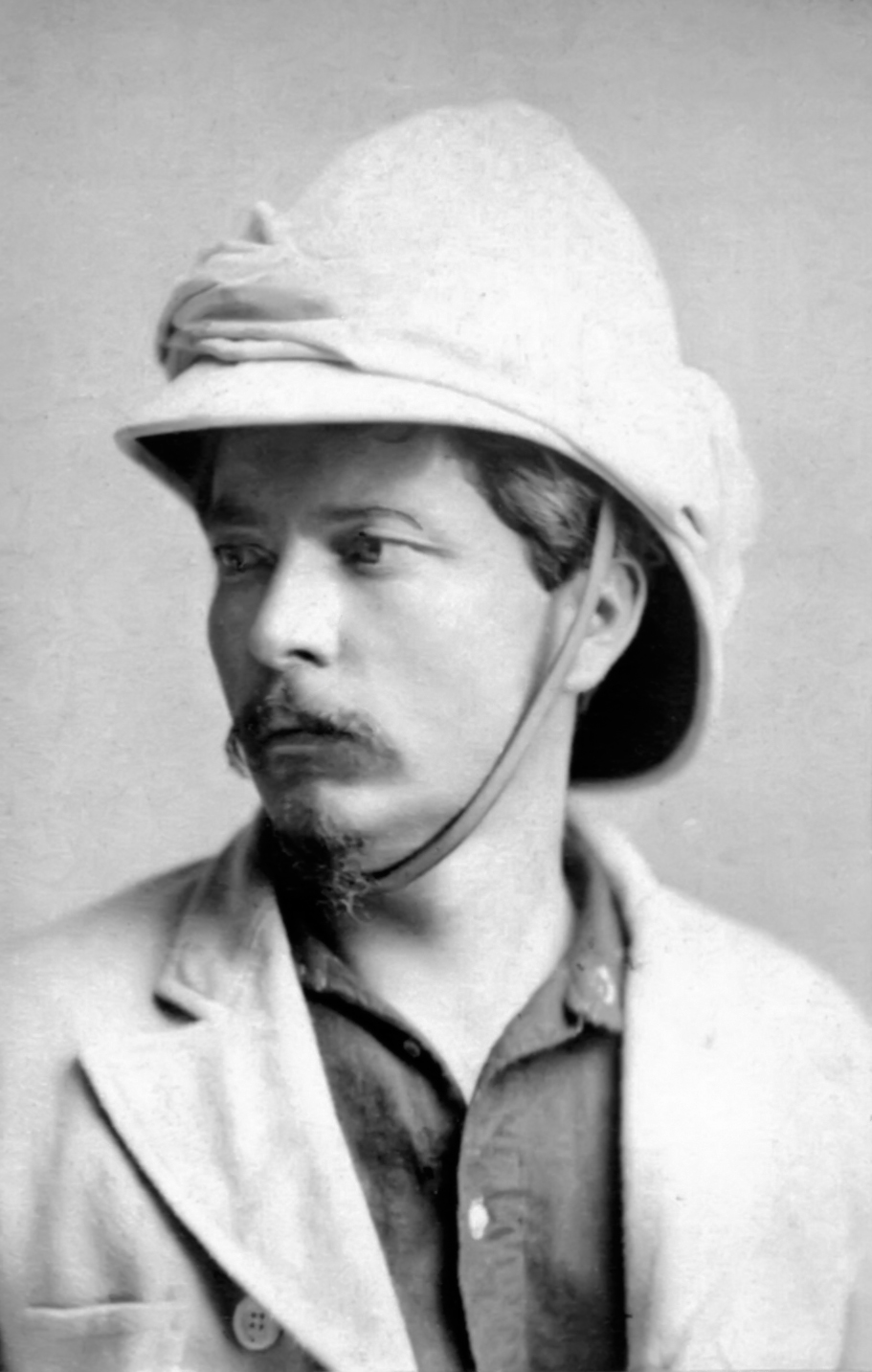
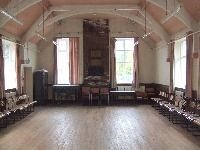
 Click to edit block quote. What quote or client recommendation really sums up your business?
Click to edit block quote. What quote or client recommendation really sums up your business? 
